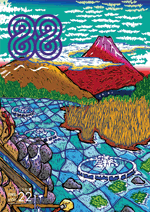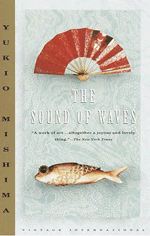Minor Press
Green & 88
|
Green, published in English in Hawai’i, and 88, published in Japanese in Tokyo, are two free magazines that are radically different in style and appearance, but identical in spirit. They both focus on sustainable living practices. At 60 pages (of recycled paper), and with several large corporate sponsors, Green is definitely a more ambitious project. Although they are only on their 3rd issue, they have distribution throughout Hawai’i and cover a robust range of topics whose interest extends beyond the tropical archipelago. Eco-friendly weddings, rooftop gardens and organic farming were just a few of the many informative columns in the recent issue. 88 has been around for several years. It is beautifully designed, printed on rice paper and distributed around Japan. The magazine has some large sponsors, but you can still see its free-spirited, hippie roots, from the small shops whose banner ads it runs to eclectic information it provides on earth-friendly products and events. With so many Japanese free magazines that amount to so much garbage, it is refreshing to see a company doing it right! |
ハワイで出版されている『Green』と東京で発行されている『88』、この二つの無料雑誌は外観こそかなり異なるが、どちらも環境に優しい生活習慣というものに焦点を当てており、誌面作りの精神の面では共通のものが感じられる。 再生紙を使った60ページほどの『Green』は大手の企業スポンサーがいくつか付いていて、かなり意欲的な作りだ。発行はまだ3回目だが、ハワイ全土で手に入り、話題も豊富で充実の内容。環境に配慮した結婚式、屋上庭園、有機農業、など、ためになるトピックが最新号でもいろいろ取り上げられている。 一方『88』は数年前に創刊、わら紙を使った美しい作りで日本全国で手に入る。こちらにも大きなスポンサーが付いているが、比較的小さなショップのバナー広告から環境に優しい製品や催しに関する情報に至るまで、自由な感じの誌面作りが特徴。あまり読まれもせずにゴミ箱行きとなる無料雑誌が多い中、このような内容のしっかりした読み応えのある無料雑誌の存在は嬉しい。 |
Borderless Reading
The Sound of Waves
|
Mishima Yukio’s novella “The Sound of Waves” (潮騒 shiosai, 1954) is perhaps his most accessible work and a rarity when compared to the rest of his body of work. Unlike so many of his other psychologically complex (and politically charged) novels, this early work is an elegantly structured love story. The setting for his work is Kamishima (see page 34), though Mishima changed the name of the isle to Utajima (Song Island). His description of it as relatively deserted remains somewhat true today. For the young protagonist, Kubo Shinji, life in the tiny fishing village is quiet until a wealthy resident, Miyata Terukichi, decides to call his daughter back to the village from a nearby island. The beautiful Hatsue is the target of considerable attention, especially after Miyata promises to adopt her future husband into the family (and his wealth). Kubo’s chances look good until a former admirer of his, Chiyoko, returns from Tokyo. Will his love for Hatsue prevail over Chiyoko’s jealousy and machinations? Not without some drama, naturally. |
『潮騒』は三島由紀夫の他の小説と作風が異なり、最も読みやすいものの一つとされている。他の作品は人間の複雑な心理を描いていたり、政治的なメッセージが込められていたりするものが多いが、『潮騒』は例外的に素直な恋愛小説に仕上がっている。小説の舞台になっている「歌島」は三重県鳥羽市に属する神島(34ページ参照)のことである。ちょっと寂れた感じの島として描かれているがその雰囲気は今でも残っている。 若き主人公、久保新治はこの小さな島で漁夫として静かな生活を送っていたが、近くで裕福な生活を送る宮田照吉が隣島に住んでいた愛娘を呼び戻したところから久保の人生は一変する。美しい初江の婿養子として宮田家に迎えられれば富が約束されていたことから誰が婿養子になるのか、注目の的だった。久保もその地位を狙っていたが彼にかつて想いを寄せていた千代子が東京から戻ってきたことで話は複雑になってゆく。久保の初江に対する気持ちと千代子の嫉妬、駆け引きが絡み合って、三島の作品の中では例外的に単純な作風とはいえ、一筋縄ではいかない面白さがある。 |










